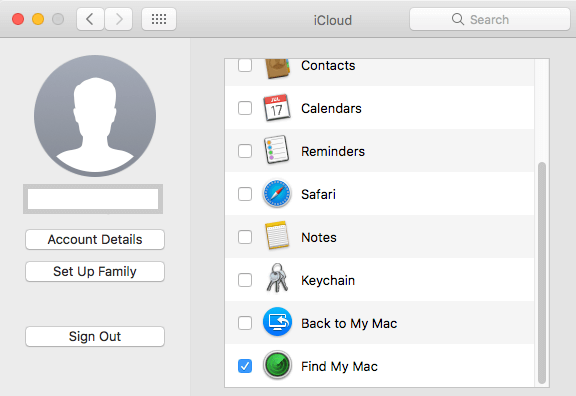To find the details, tap the little Apple logo in the upper-left corner of your screen (see image above), then scroll down to the first option (called About This Mac). As you can see from the image above, you can now identify which year your Mac was released, which operating system is installed, and a few general hardware highlights. AutoSave is a different feature which automatically saves your file as you work - just like if you save the file manually - so that you don't have to worry about saving on the go. On the Mac, AutoSave is available in Excel, Word, and PowerPoint for Microsoft 365 for Mac subscribers. When AutoSave is turned on AutoRecover files are rarely needed.
- See what makes each Mac notebook and desktop different. And find the one that’s perfect for your life, your work, and your budget.
- Explore the world of Mac. Check out MacBook Pro, iMac Pro, MacBook Air, iMac, and more. Visit the Apple site to learn, buy, and get support.
- Click it into Excel Options window. Figure 3: Open Excel Options window from Excel 2010 Ribbon. There is another way to find out the Options button in the backstage view: Click the File tab; Click the Help button at left bar; In the middle pane, you will view the Options.
Mail User Guide
Use Server Settings preferences in Mail to change options for an account’s incoming and outgoing (SMTP) mail servers.
To change these preferences in the Mail app on your Mac, choose Mail > Preferences, click Accounts, then click Server Settings.
Note: The settings you see vary depending on your account type.
Incoming mail server settings
Option | Excel shortcut keys for mac. Description |
|---|---|
User Name | Your user name on the mail server. |
Password | Your password on the mail server. |
Host Name | The name of the mail server. |
Automatically manage connection settings | Mail automatically manages settings for your email account in Mail, such as port numbers and authentication methods. If you deselect this option, you can specify the following, as directed by your email account provider:
|
Advanced IMAP or Exchange Settings | Enter or change these settings as directed by your email account provider:
|
Find Option For Mac Computers
Outgoing mail server (SMTP) settings
Option | Description |
|---|---|
Account | The account of the mail server. To change outgoing server settings, as directed by your email account provider, click the Account pop-up menu, then choose Edit SMTP Server List. Similarly, you get to choose here you want to have the files extracted: next to the originals, at a custom location, or in a user selected folder.Share safely just setting a password and creating highly encrypted files.Using AES-256 encryption specification for your 7z files andZip 2.0 legacy encryption specification for your Zip files. Keka download mac. Keka will automatically recognize if the file dropped on top of its window or Dock icon is an archive, and automatically starts extracting the contents. Using the latter option might be advisable since you will also have the option to add custom names to the archives. |
User Name | Your user name on the mail server. |
Password | Your password on the mail server. |
Host Name | The name of the mail server. |
Automatically manage connection settings | Mail automatically manages settings for your email account in Mail, such as port numbers and authentication methods. If you deselect this option, you can specify the following, as directed by your email account provider:
|

Where is Excel Options in Microsoft Excel 2007, 2010, 2013, 2016, 2019 and 365?
How to Bring Back Classic Menus and Toolbars to Office 2007, 2010, 2013, 2016, 2019 and 365? |
Familiar way to open Excel Options if you have Classic Menu for Office
If have installed Classic Menu for Office on your computer, you will discover that the classic style drop down menus and toolbar come back into Ribbon under Menus. So you can follow your use habit in Excel 2003 to seek for Excel Options in Microsoft Excel 2007/2010/2013:


- Click the Tools drop down menu under Menus tab;
- Then you will view the Excel Options item. Click it, and you will enter into Excel Options window.
Figure 1: Open Excel Options window from Classic Menu
Open Excel Options from Excel 2007 Ribbon if you do not have Classic Menu for Office
- Click the Office button at the upper-left corner;
- At the bottom, you will view the Excel Options button. Click it into Excel Options Window.
Figure 2: Excel Options button in Excel 2007 Ribbon
Open Excel Options from Excel 2010/2013/2016/2019 Ribbon if you do not have Classic Menu for Office
- Click the File tab jumping into backstage view;
- Then you will view the Options button at left bar. Click it into Excel Options window.
Figure 3: Open Excel Options window from Excel 2010 Ribbon
There is another way to find out the Options button in the backstage view:
- Click the File tab;
- Click the Help button at left bar;
- In the middle pane, you will view the Options button under the Tools for Working With Office.
More Tips for Microsoft Excel 2007, 2010, 2013, 2016, 2019 and 365
Find Option For Mac Osx
Classic Menu for Office
Find Option For Mac Shortcut
Brings the familiar classic menus and toolbars back to Microsoft Office 2007, 2010, 2013, 2016, 2019 and 365. You can use Office 2007/2010/2013/2016 immediately without any training. Supports all languages, and all new commands of 2007, 2010, 2013, 2016, 2019 and 365 have been added into the classic interface.
Macy's Options Chain
Classic Menu for OfficeIt includes Classic Menu for Word, Excel, PowerPoint, OneNote, Outlook, Publisher, Access, InfoPath, Visio and Project 2010, 2013, 2016, 2019 and 365. |
Classic Menu for Office 2007It includes Classic Menu for Word, Excel, PowerPoint, Access and Outlook 2007. |